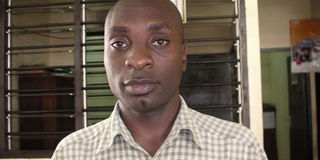How I escaped from killers in petrol station

NTV journalist Nehemiah Okwembah. He was attacked by GSU officers with his Citizen tv counterpart in Tana River. FILE PHOTO
What you need to know:
- He answered them by going down on his knees and saying a prayer. The attackers held him by the neck and led him to a nearby bar where they forced him to drink three bottles of soda. He protested that he was full but was given two choices; To drink the sodas or take a bullet.
Three other journalists and I were on our way to Lamu to cover a function that was to be presided over by Governor Issah Timamy.
As we approached Witu — about 35km from Mpeketoni — we were stopped by a policeman at a roadblock. He warned us not to proceed because there would be danger ahead. He did not elaborate, only saying he too had scant information. The time was 7.20pm. We chose to continue with the journey.
A few kilometres ahead, we found a Simba Coach bus that had stopped at a trading centre and the driver told us that he had been warned by his colleagues in Lamu not to proceed because gunmen had invaded the area and were on a shooting spree.
After a brief exchange, we all agreed to drive on and in less than 30 minutes, we arrived at Kibaoni where we were flagged down by residents who again told us not to proceed.
Just then, we heard gunshots. Smoke was billowing into the night sky and someone told us Mpeketoni was under siege.
In less than 30 minutes the gunshots grew louder. Everyone was shaken. This could mean only one thing: The gunmen were almost reaching us. We all scattered in different directions. I hid inside a toilet within the Kibaoni filling station and was followed by the security guard who later identified himself as Mr Guyo Boroni.
Mr Boroni would turn out to be our saviour later in the night. It was he who chanted an Islamic prayer to the gunmen and that prayer made all the difference. Our hide-out was not torched.
As it were, he had walked out to check on the security situation when he was spotted by one of the attackers. “Waria,” they shouted at him. “Wewe ni Muislamu (are you a Muslim)?”
He answered them by going down on his knees and saying a prayer. The attackers held him by the neck and led him to a nearby bar where they forced him to drink three bottles of soda. He protested that he was full but was given two choices; To drink the sodas or take a bullet.
At some point, the attackers wanted to burn down the entire filling station but Guyo told them that the property belonged to a Muslim.
After they were done with killing and burning in the shopping centre, they proceeded to a nearby junction where they continued with their orgy of violence between 11.30pm and 6am.
All this time, I was on my belly on the toilet floor. I could hear them conversing mainly in Somali but occasionally two or three would talk in fluent Swahili. Every so often, bullets would hit the wall of the toilet I was in. I was terribly shaken. There was nothing I could do; I just remained calm and waited for my turn.
Once in a short while, unsuspecting motorcycle riders would approach the junction where they were stopped, asked whether they were Muslims or not.
If they were not, they were shot in the head at close range. In all, about six people who arrived on motorbikes were shot at the junction. In the morning, when I finally left my hideout, I saw two bodies which had been hacked.
After 1am, the gunshots went quiet but at about 2am they rang out again after two vans drove into the petrol station. It was a reunion between the attackers and their colleagues who had remained in Mpeketoni to carry out further attacks.
Initially there were about six to 10 men, but after the vans arrived I could hear a huge group but could not figure out how many there were.
At dawn, the gunmen left the petrol station in two vans and a Land Cruiser. When we left our hideouts we were confronted by the full horror of the damaged inflicted on the town the night before. In the distance, we could hear women wailing.





